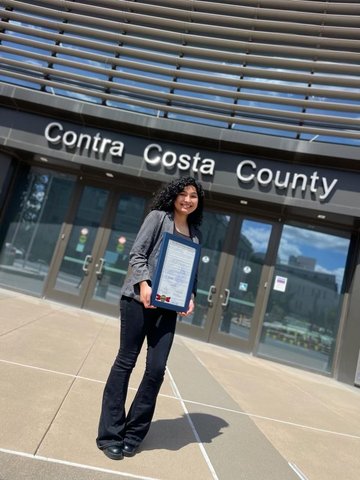
31 Jul ‘Nobody Calls Because It’s Their Best Day Ever’: My Summer With the Antioch Police Department

Recent Antioch High grad Morelia Gil Cubillo shares her story of interning at the Antioch Police Department this summer. (Photo courtesy of Morelia Gil Cubillo)
Commentary, Morelia Gil Cubillo
Sitting beside Dispatch, I counted seven glowing monitors — each dedicated to a different slice of emergency response: radio, call trackers, gunshot identifiers. My ears filled with “Code 5150,” “6, Train, Robert, James, 2, 4, 4.” Then, “Medical aid, my sister’s unconscious,” a male voice pleaded. A young man had just found his sister unresponsive, but breathing, and dialed 911. After the call, my colleague looked over and quietly reminded me, “Nobody calls because it’s their best day ever.” That line echoed through the rest of my summer internship with the Antioch Police Department.
I wanted a summer job between high school graduation and the start of college. No, I needed a job. And I wanted to better understand how my hometown works, so I applied to the Springboard Internship Program through the city of Antioch. Serendipitously, I was placed with Antioch Police; just days before this internship began, I completed an introductory criminal justice class — a senior dual-enrollment course taught at Antioch High School by a Los Medanos College instructor. Thus, I started this internship with many questions, eager to experience the system I had learned about in essays and lectures with a backstage pass. That course taught me the importance of understanding the three pillars of the justice system: law enforcement, courts and corrections. If a democratic society wants officers, judges and lawmakers to be accountable to the citizenry, the public needs to understand what they actually do.
I was assigned to the APD Records Unit. The occasional phone call punctuated the constant thrum of fluorescent lights and keyboards, which formed the soundtrack to each day. My main task was scanning recent and decades-old case files and transferring them into a digital system. By internship’s end, I had processed over 1,200 cases. Most days, filing, scanning and cross-referencing filled all hours. I shadowed other units as — Investigations, Crime Analysis and, of course, Dispatch.
At the front counter, I helped interpret for Spanish-speaking residents who entered anxiously after having waited five to 12 months to have basic errors in their case’s paperwork or report corrected. Insistent on having their voices heard, they explained and re-explained their situations even once we explained there was nothing more the front counter could do for them. They weren’t mad at me — they were just tired of being ignored.
Interpreting was nothing new to me. As a child of Mexican immigrants, I have long served as a bridge between two worlds. Since elementary school, I have acted as an interpreter — translating baking instructions, parent-teacher meetings, phone calls, you name it. I also took on the role of interpreter and translator as an office assistant at AHS.
Still, I was surprised to learn that, in a community consisting of 36.1% Latinos, according to the Bay Area Census, there was no Spanish speaker at the front counter at all times. Even so, I was glad to meet the two new Latina hires for the records office.
I learned quickly that police departments are about much more than crime control. Paperwork — so many reports — drives everything. Reports taken soon after crimes capture details that victims will likely forget as days pass and give investigators timelines to work with. However, while reading crime analyst update spreadsheets tracking firearm, vehicle theft and assault cases, I noticed at least a third of the police reports I scanned lacked necessary information.
Antioch leads Contra Costa County cities in a contest no one wants to win. Over 1,600 vehicles were stolen here last year, “besting” second place Richmond by hundreds. Most mornings began with two or three people at the front counter, waiting to report their cars stolen, and, as the day progressed, stolen vehicle calls flowed into the Records Information Management System the way the tide peaks and ebbs in the delta.
This internship also taught me that workers in a large organization often feel lonely. But three weeks in, something happened to bring us more together than our weekly ice breakers. At noon, a co-worker returned from break, hands close to her chest, cradling a kitten she’d found all alone, mewling in a parking lot space. Four of us followed her outside, hoping to find the mother. After 10 minutes of searching, my boss walked next door to ask Animal Services for professional help. An Animal Services worker placed the kitten in a box outside with a pink blanket, saying she would return at 4 p.m. to see whether the kitten’s mother had returned.
I checked on the kitten once or twice per hour by 3:30. As the kitten grew weaker, I convinced our boss to bring the kitten inside. Four of us huddled together: one kept the kitten warm, I helped it go to the bathroom, another cooled overheated formula that Animal Services provided. We fed him together.
Caring for this kitten brought us literally together and emotionally closer. Afterwards, a co-worker from Records sought me out to share pictures of her volunteering at a zoo — fondly reminiscing about her experience.
My internship began with co-workers keeping the office door closed when I needed to grab files and ended with a doorstop, shared pizza, and long conversations about the future.






No Comments